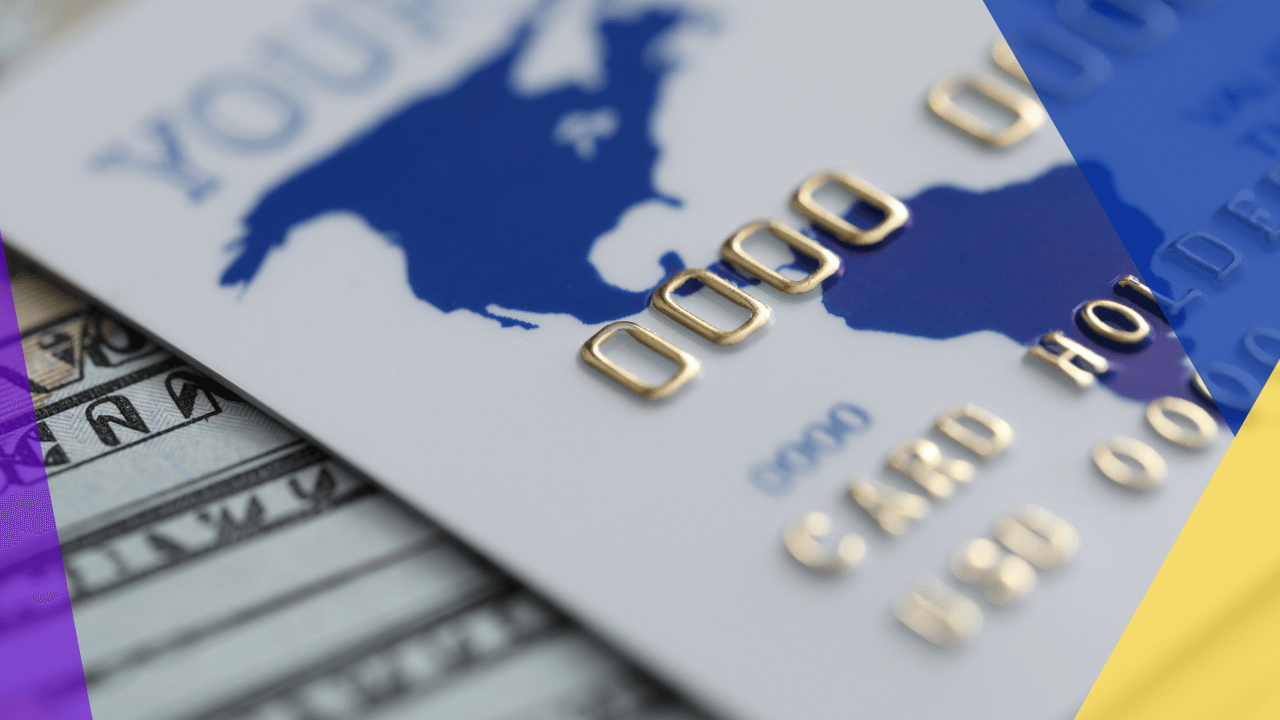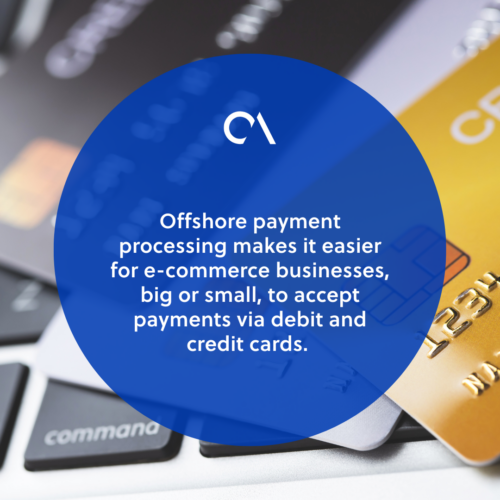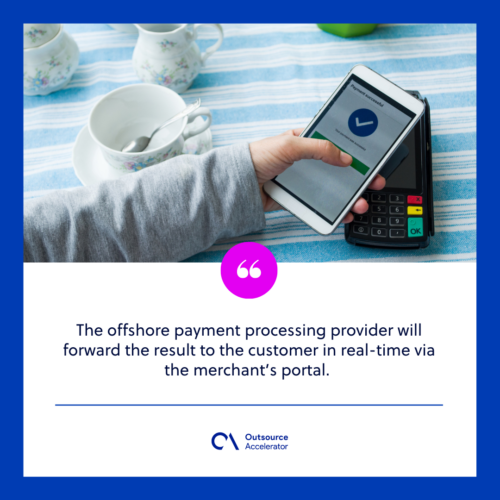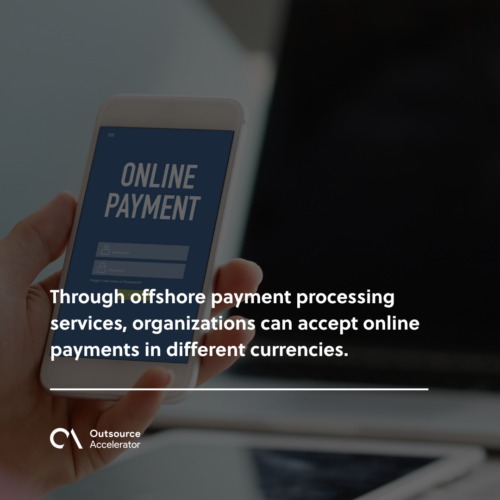Secure your business with offshore payment processing

Online shopping has now become the norm as customers have opted for convenience and speedy transactions when processing payments. Thanks to the internet, brands’ reach is not limited to local customers.
For e-commerce businesses, enabling different modes of payment, such as debit cards and credit cards, has become a number one requirement. However, some businesses still struggle to accept and process various banking and credit card transactions.
Payment processing is your company’s lifeline. It will be impossible for your firm to function efficiently if you do not have a payment acceptance system in place.
It is a good thing that offshore payment processing services are available to relieve businesses of this kind of dilemma.
Defining offshore payment processing services
Offshore payment processing is also known as offshore merchant services. This kind of service makes it easier for e-commerce businesses, big or small, to accept payments via debit and credit cards.
Some of the industry-leading credit card companies include Mastercard, American Express, and Visa.
Through offshore payment processing services, businesses can easily process online payments from customers worldwide. This includes fees in all types of currencies.
Offshore payment processing providers have offshore banking solutions for organizations in all business sectors.
2 types of offshore merchant services
Offshore merchant services are payment gateways that enable you to take credit card payments online.
Merchant services are classified into two types:
- Credit card processing. You may accept credit cards instantly on your website or on-site through a digital device, such as a card reader or mobile app.
- Online payments. This type of merchant service assists businesses in accepting online payments from customers who do not have access to traditional payment methods such as cash or checks.

Which types of businesses offshore payment processing?
Offshore merchant services are mainly applicable to high-risk merchants. However, other types of businesses can also acquire this offshore merchant account.
High-risk merchant accounts
High-risk merchant accounts are businesses vulnerable to illegal transactions. Their payment processors label these businesses as high-risk merchants.
Thus, they may be prone to a large number of chargebacks, fraudulent transactions, and refunds.
Not all high-risk merchants are deemed illegal. However, some are considered to have poor offshore credit card processing scores, non-compliant with security regulations, and are susceptible to high volumes of sales.
Given these risks, banks usually charge these merchants additional fees or, worse, block them from future transactions.
Weapon retailers, blockchain, health, finance, travel, and other merchants are examples of merchants in the high-risk category.
Low-risk merchant accounts
Businesses categorized under low-risk merchants are in the beauty, retail, or restaurant sectors. Although they are classified as low-risk, they can also opt for offshore payment processing as long as they have a low chargeback ratio.
E-commerce
E-commerce businesses typically sell to customers all over the world and processing international payment transactions can be challenging.
The e-commerce industry can fully take advantage of offshore payment processing, as it can reach a wider demographic and boost its income generation.
How offshore payment processing services work
Offshore payment processing providers offer reliable online payment solutions and fraud management. Offshore processors provide payment gateways to their clients.
This helps them ensure that all online payment transactions coming from multiple locations are successful.
Here’s how offshore payment processing typically works:
- Customers purchasing online will need to log in on the merchant’s website or online portal.
- From there, they will be required to fill in the required information for their chosen payment method. These payment methods can be through the customers’ debit card, credit card, online banking, and others.
- All data input will be sent to the merchant’s bank.
- The transaction will then be transferred from the merchant’s bank to the customers’ issuing bank network, where it can either be approved or declined.
- Whatever the result is, it will be sent to the merchant’s bank.
- The offshore payment processing provider will forward the result to the customer in real-time via the merchant’s portal.
- Once the transaction is approved, the issuing bank transfers the funds to the merchant’s account. This includes automated receipts that are also sent to both customers and merchants.
Both merchants and customers are guaranteed that all these steps are done securely and within a matter of seconds or a few minutes.

4 significant perks of offshore payment processing
Businesses can fully leverage offshore payment processing as it offers the following benefits:
Security
Offshore payment processing providers are known for their rigorous security standards. They implement stringent security measures like screening systems, address verification systems, and fraud management.
They also provide 24/7 customer support, which helps businesses detect fraud and chargebacks.
Easy payments in various currencies
Through offshore payment processing services, organizations can accept online payments in different currencies. This greatly reduces cart abandonment, as consumers are allowed to pay according to their preferred currency.
Increased profitability
As we have mentioned, customers prefer online shopping over going on a trip to the actual store because it is more convenient.
For this, offshore payment processing enables customers to transact with businesses online conveniently. In turn, these businesses are more likely to obtain repeat purchases and retain their customer base.
Cost-efficiency
While there are numerous advantages to using offshore payment processing services, one of the most significant is lower transaction costs.
Offshore payment processing grants businesses the opportunity to sell their products and services worldwide cost-effectively. Further, it also helps businesses to cut their overall costs as they can reduce foreign exchange fees and decrease their tax expenses.
Overall, offshore payment processing helps businesses to cut a huge chunk of their operational costs.

How to get started with offshore payment processing
If you are looking for some ways to start your business with offshore payment processing, here are the steps you should take.
Choose an offshore merchant account provider
Before anything else, it is incredibly important for you to conduct thorough research before partnering with payment processors, especially if the business is high-risk.
You must select an offshore payment processor that can offer them the finest service at an affordable price. This guarantees that your consumers can pay for the goods and services they buy from you in real-time.
These payment processor firms usually have extensive knowledge and experience in handling different types of currencies and regulations in different countries.
Partnering with a trusted one ensures that it complies with all the necessary laws and regulations related to currency exchange.
There are many processors available these days, but you must ensure that this provider has experience with international payments.
Set up offshore merchant accounts
To be able to manage offshore payment processing, you will need to work with a foreign bank that accepts your business. You can use this account for all business financial transactions, such as deposits and withdrawals.
Ensure the bank is licensed and regulated by the government in its home country. This will help protect you from all the fraud or other illegal activities that may greatly affect your business.
Integrate your payment system
Having an integrated system allows your business to accept payments from anywhere in the world without having to manually enter them into your website.
Moreover, this will help you have secure payments and manage as well as organize the entire transaction process.







 Independent
Independent




